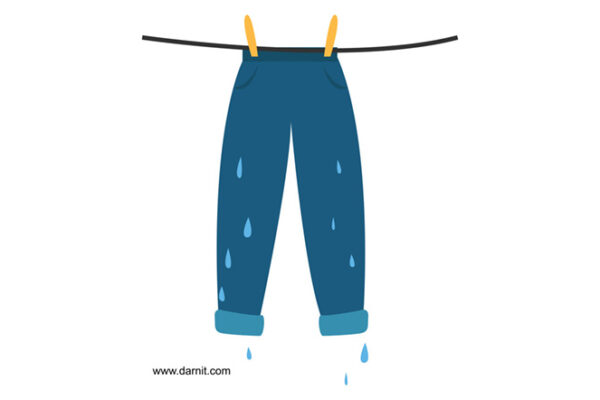Reprinted from Boston Globe
By Steve Maas Globe correspondent January 15, 2016
Jeff Glassman joined his family’s apparel business in 1994 and things almost immediately went south — literally.
That was the same year the North American Free Trade Agreement went into effect. By 1996, the New Bedford factory had lost so much business to lower-cost competitors in Mexico that it laid off more than three-fourths of its workers.
Then, to add insult to injury, an old customer asked if Glassman could fix 30,000 trousers that had torn seams, oil stains, and crooked labels because of shoddy work in Mexico.
That request — which Glassman admits ticked him off at first — led him to launch his own company that specializes in repairing and refurbishing clothes, whether damaged in flawed manufacturing processes in China or returned to retailers in less than pristine condition. At any given time, the company, which Glassman named Darn It!, may be involved in a dozen or more rescue projects, from fixing clasps on costume jewelry to sewing seams on poorly stitched trousers to correcting the size label on 40,000 bras.
“We have no idea what we’re going to get,” said Glassman. “It’s our job to be prepared for anything that comes on the way.”
Darn It! has grown from the handful of employees who fixed the NAFTA rejects to more than 80, who not only fix clothing, but also watches, hats, shoes, jewelry, housewares, and camping equipment. Glassman, who declined to disclose revenues, said he refurbishes products for more than 150 customers, including retailers, wholesalers and major brands. He is prohibited by contract from disclosing their names.
The company’s biggest job came in 2010, when it inspected 470,000 T-shirts for stains, flaws, and crooked necklines over six weeks.
The company expanded beyond textiles when a wholesaler, for whom DarnIt! had relabeled T-shirts, asked for help saving 10,000 cheese trays stained by the black dye from their zippered canvas bags. Darn It! figured out a solution in a couple of days. It sanded and refinished the boards, repackaging them in wax paper. “They looked brand spanking new,” Glassman said.
Glassman, 47, grew up with the clothing manufacturing business. Both his grandfather, Meyer, and father, Norman, owned and operated textile companies in New Bedford. He recalls as a child sorting buttons and thread at Ronnie’s, his father’s company.
Ronnie’s, named for Glassman’s mother, produced women’s apparel for various brands and stores.
Glassman graduated from the Isenberg School of Management at the University of Massachusetts-Amherst in 1990 with a bachelor’s in business administration. At his dad’s urging, he gained experience elsewhere, working at retailers before entering the family business a few years later.
As competition from low-cost foreign factories drove Ronnie’s to slash its workforce to 75 from 350, Glassman lined up a job as a financial adviser at Smith Barney in Boston.
But the rescue of the 30,000 pairs of Mexican-made pants stoked his entrepreneurial instincts. His mother suggested the name “Whoops” for his new company, but that had already been taken by a competitor in New Jersey.
By 1996, when Darn It! was established, Ronnie’s had closed. Glassman’s family still operated a spinoff company that produced Polar fleece garments, but that, too, succumbed to foreign competition a few years ago.
Clients typically turn to Darn It! after they discover through spot checks an unusually large number of defects in a shipment, or if they want old inventory and returns inspected. Their orders often come with demanding deadlines.
“If a customer comes in tomorrow and says, ‘I need 30,000 units looked at, and you’ve got five days,’” Glassman said, “our job is to figure out a way to get it through our system.”
One worker may press wrinkled garments in the morning, remove stains in the afternoon, and inspect shoes for scuff marks or excess glue the next day. Darn It! has several processes for cleaning and deodorizing clothes that become mildewed because they aren’t sufficiently dried before being stuffed into shipping containers.
“Most of our people are cross-trained on all sorts of operations — sewing, inspecting, pressing, spot cleanings, Glassman said. “It’s our job to make sure we can shift gears at any time and have the people to do it.
In 2007, he bought a 315,000-square-foot New Bedford mill or $1.6 million. Afterward, he learned that it once housed a sewing plant where his great-grandfather had worked.
Darn It! also operates a warehouse and distribution arm, which now accounts for 40 percent of revenues. The division has more than 20 customers, mostly wholesalers and Web-based businesses, looking to save on overhead. Their merchandise — which ranges from clothes to books to watches — is shipped in bulk to Darn It!, which then separates orders and sends them to stores and homes.
Glassman said that by offering refurbishment, packing, and shipping services under one roof, Darn It! has a leg up on its competitors.
BayCoast Bank of Swansea helped provide financing for the mill purchase. Its first vice president, Stuart Lawrence, has overseen loans to three generations of Glassmans.
“They don’t jump into something very quickly without doing their research,” Lawrence said. “They are hard-working and extremely savvy business people.”
Savvy enough to see the profits — and poetic justice — in capitalizing on the very foreign competition that nearly did them in.



